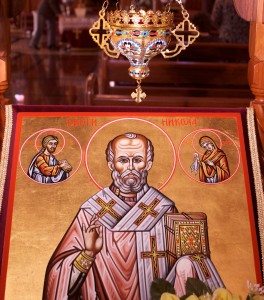Diverse Beatitudes – Metropolitan of Strumica Nahum
 ~+~
~+~
Read the beatitudes carefully to notice the difference:
When he saw the people, he went up into the mountain; and as he sat, his disciples came to him. And when he had opened his mouth, he taught and said,
“Blessed are the poor in spirit,
For theirs is the kingdom of heaven.
Blessed are those who mourn,
For they shall be comforted.
Blessed are the meek,
For they shall inherit the earth.
Blessed are those who hunger and thirst for righteousness,
For they shall be filled.
Blessed are the merciful,
For they shall obtain mercy.
Blessed are the pure in heart,
For they shall see God.
Blessed are the peacemakers,
For they shall be called sons of God.
Blessed are those who are persecuted for righteousness’ sake,
For theirs is the kingdom of heaven.
Blessed are you when they revile and persecute you, and say all kinds of evil against you falsely for My sake.
Rejoice and be exceedingly glad, for great is your reward in heaven, for so they persecuted the prophets who were before you. (Matthew 5: 1-12).
Take a heed furthermore: I would call the aforementioned beatitudes, the special beatitudes, uttered before His Apostles, alone, on the mountain, these differ from the ordinary beatitudes, which the God-Man Christ speaks before the faithful people, after healing multitude of their infirmities and those possessed (by demons), down on the plane – as is the reading in today’s Gospel:
“ And He came down with them and stood on a level place with many of His disciples, and, a great multitude of people from all Judea and Jerusalem, and from the coastal cities of Tyre and Sidon, who came to hear Him and be healed of their diseases, as well as those who were tormented with unclean spirits. And they were healed. And the whole multitude sought to touch Him, for power went out from Him and healed them all.
Then He lifted up His eyes toward His disciples, and said:
‘Blessed are you poor,
For yours is the kingdom of God.
Blessed are you who hunger now,
For you shall be filled.
Blessed are you who weep now,
For you shall laugh.
Blessed are you when men hate you,
And when they exclude you,
And revile you, and cast out your name as evil,
For the Son of Man’s sake.
Rejoice in that day and leap for joy!
For indeed, great is your reward in heaven,
For in like-manner their fathers did to the prophets.'”(Luke 6: 17-23).
Have you noticed yourself? It is one thing to be poor and another to be poor in spirit.
It is one thing to hunger for bread, it is another to hunger and thirst for justice.
It is one thing to be hated, separated and blasphemed, and another to be physically persecuted for the sake of God’s justice – Christ.
The Lord Christ addresses all according to the level of their spiritual development. Those who live a natural way of life – the Apostles, He teaches them how to attain deification from the level of enlightenment, and those who live an unnatural way of life (disorder, neurosis), as well as those who are at the stage of purification of their hearts from passions – the inexperienced people, He teaches them how to reach the level of enlightenment of the mind and enter the natural way of life.
The ordinary beatitudes of today’s Gospel reading refer especially to Christians who do not live an active spiritual life, that is, to those who do not voluntarily struggle or do not struggle enough, and are therefore subject to real involuntary suffering: poverty, hunger, suffering (sickness) and weeping, as well as those who will endure only mockery and condescension, but not physical persecution, for the sake of the God-Man Christ.
Yet, every single one, even such beatitudes, from the perspective of the Kingdom of Heaven, is a gift from God, although it does not seem so to us as we experience it. Let us dwell a little on poverty as the most widespread and most actual (tangible) gift of God and compare it with wealth.
Our whole life, without question, is a gift from God. Poverty is also a great gift of God, when the poor person with humility and patience gives thanks to God for it, and recognizes this gift. Wealth is also a gift of God, when the rich person with humility and patience serves the poor with his wealth, and thus gives thanks to God for it, and recognizes this gift.
If people recognise the gifts of God and their meaning, and if they treat them with humility and gratitude, the gifts of God would serve as a means of their catholic (congregational) upgrading and achieving our communion in the God-Man Christ – which is our greatest gift of God – and the gifts of God would serve as a means for our spiritual enrichment and transfiguration.
We see that God identifies (even unto the most) with every single sufferer. Therefore, whenever we use our riches to help one of these little brothers of Christ who is suffering, we do not gather or accumulate for ourselves, but we get richer in God. In other words, only in this way can we thank God when we offer His gifts to Him again: “Your own of Your own we offer to You, in all and for all (for everyone and for everything). ”
The effective relationship of thanksgiving, from our entire life, is catholically fulfilled with our regular participation and communion in the Holy Eucharist (Thanksgiving) of the Church of God.
Furthermore, St. Nicholas, whose memory we commemorate today, was rich, but at the same time merciful and generous to the poor – even before he became a Bishop. There is a folk saying that we should not hate St. Nicholas because of (the actions of) priest Nicholas, but the most accurate interpretation of the saying is; that we should love every Nicholas and every other person – no matter who he is and what he is, if we really love Saint Nicholas – because he was merciful and he loved everyone. After all, that is why he is Saint Nicholas.
I would like to share personal insight. When I was young, I did not have a very high reverence for Saint Nicholas; I preferred Saints that are renowned as great theologians, such as Saint Gregory Palamas, Saint Basil the Great, Saint Gregory the Theologian, etc. But God placed me, as a monk, in the Gregoriou Monastery dedicated to Saint Nicholas. In such a fraternity you cannot but regularly meet the interventions in your life of all the saints who are revered there; and you cannot but love them so much. Besides Saint Nicholas, there were also St. Gregory, St. Anastasia of Rome, Sts. Cyricus and Julitta. For example, for any pain or illness that afflicted us in our lives, instead of a doctor, we first went to the chapel of St. Anastasia and would anoint ourselves with the oil from her oil candle lamp (kantili, candela), and usually the illness passed at once. Thus, to this day, in every church that is being built under my supervision, I always see to it that there is a place for their images, on the frescoes and the icons.
In conclusion, no one can be called rich, that is, in the likeness of God, without enriching others around him – above all, in the spiritual, but also in the material sense of the word. And no one can be called blessed without enduring any tribulation, as a gift of God, with gratitude.
Lord Jesus Christ, through the Most-Holy Theotokos, and because of the prayers of Saint Nicholas the Wonderworker of Myra in Lycia, have mercy on us!
Metropolitan of Strumica Nahum
(18.12.2021 16:51)
 Saint Nicholas the Wonderworker, Archbishop of Myra in Lycia
Saint Nicholas the Wonderworker, Archbishop of Myra in Lycia
This glorious saint, celebrated even today throughout the entire world, was the only son of his eminent and wealthy parents: Theophanes and Nona, residents of the city of Patara in Lycia. Since he was their only son given to them by God, the parents returned the gift to God by dedicating their son to Him. The meaning of the spiritual life St. Nicholas learned from his uncle Nicholas, Bishop of Patara, and was tonsured a monk in the Monastery of New Zion founded by his uncle. Following the death of his parents, Nicholas distributed all his inherited goods to the poor, not keeping anything for himself. As a priest in Patara, he was known for his charity, even though he carefully concealed his charitable works, fulfilling the words of the Lord: Let not thy left hand know what thy right hand doeth (Matthew 6:3). When he gave himself over to solitude and silence, thinking to live that way until his death, a voice from above came to him: “Nicholas, for ascetic work go and labour among the people, if you desire to be crowned by Me.” Immediately after that, by God’s wondrous providence, he was chosen as archbishop of the city of Myra in Lycia. Merciful, wise and fearless, Nicholas was a true pastor to his flock. During the persecution of Christians under Diocletian and Maximian, he was cast into prison, but even there he instructed people in the Law of God. He was present at the First Ecumenical Council of Nicaea [325] and, out of great zeal for the truth, slapped the heretic Arius. For this act he was removed from the Council and from his archiepiscopal duties, until the Lord Christ Himself and the Most-Holy Theotokos appeared to several of the chief hierarchs and revealed Their approval of Nicholas. A defender of God’s truth, this wonderful saint was courageous defender of justice among the people.
On two occasions, he saved three men from an undeserved death sentence. Being merciful, truthful, and righteous, he walked among the people as an angel of God. Even during his lifetime, the people considered him a saint and invoked his aid in difficulties and in distress. He appeared both in dreams and in person to those who called upon him, and he helped them equally easy, whether they would have been close at hand or far away. A light shone from his face as it did from the face of Moses, and he, by his presence alone, brought comfort, peace and good will among people. In old age he became ill for a short time and entered into the rest of the Lord, after a life full of labour and very fruitful toil, in order to rejoice eternally in the Kingdom of Heaven, continuing to help the faithful on earth by his miracles and to glorify his God. He reposed on December 6, 343 A.D.
